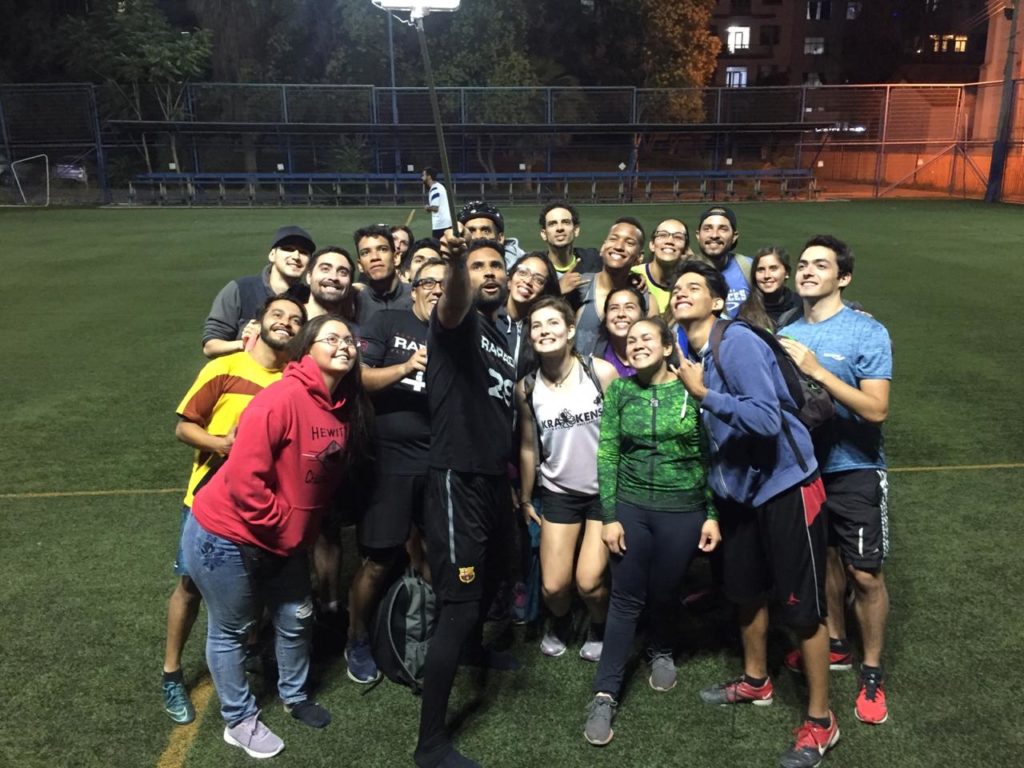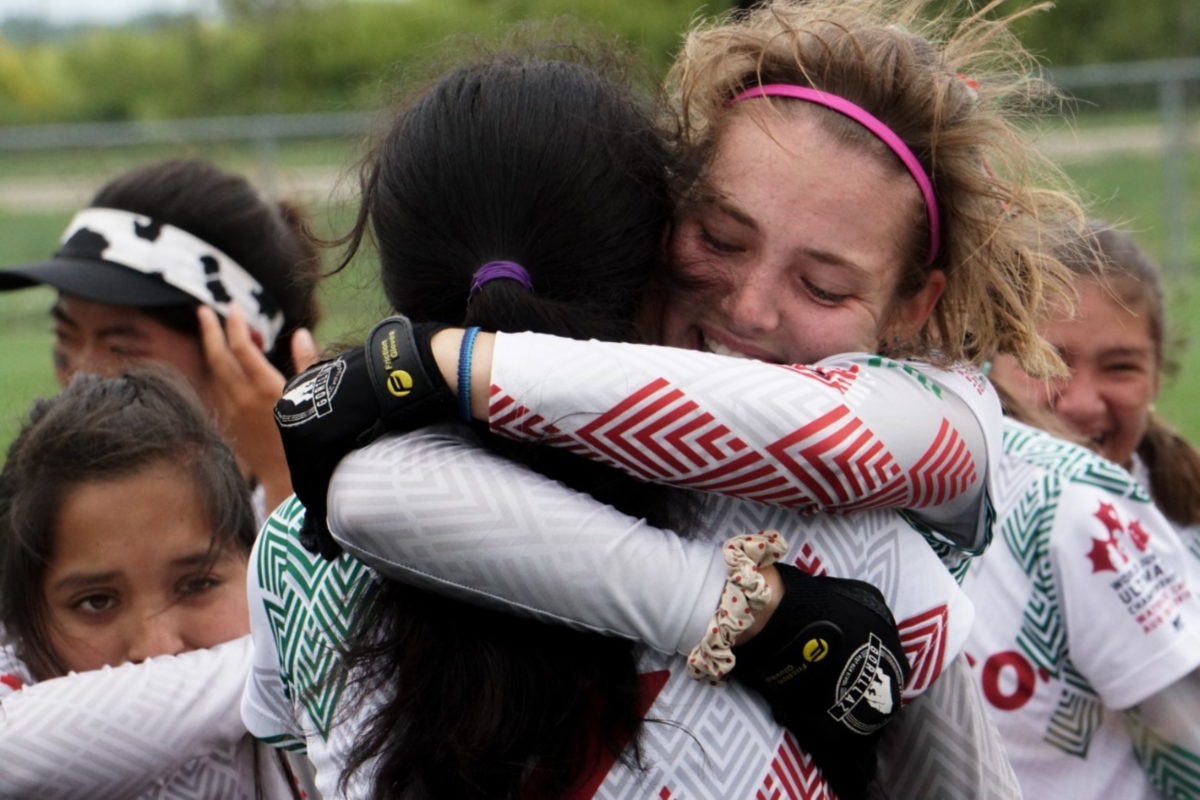When I posted on the Ultimate Chile Facebook group in December asking about opportunities to practice with a team for a week or two, I was instantly messaged on Facebook about playing opportunities around the country. I ended up connecting with a player who invited me to train with a team in Santiago named Rapaces, which stands for birds of prey. I had just arrived in the city and was unsure how to find the practice fields; he offered to meet me at a metro station near my hostel and take me to the fields so I wouldn’t get lost. At practice, I felt instantly welcomed, was incorporated into the team’s style of play and had an amazing time – I was even invited to their Christmas party that weekend.
From my experience, the warm welcome I received was common throughout Latin American ultimate. But I wondered: would U.S. players go the extra mile for a stranger who was just passing through like Rapaces did? Or would they (myself included) just ask themselves: what’s the return on investment for my extra effort?
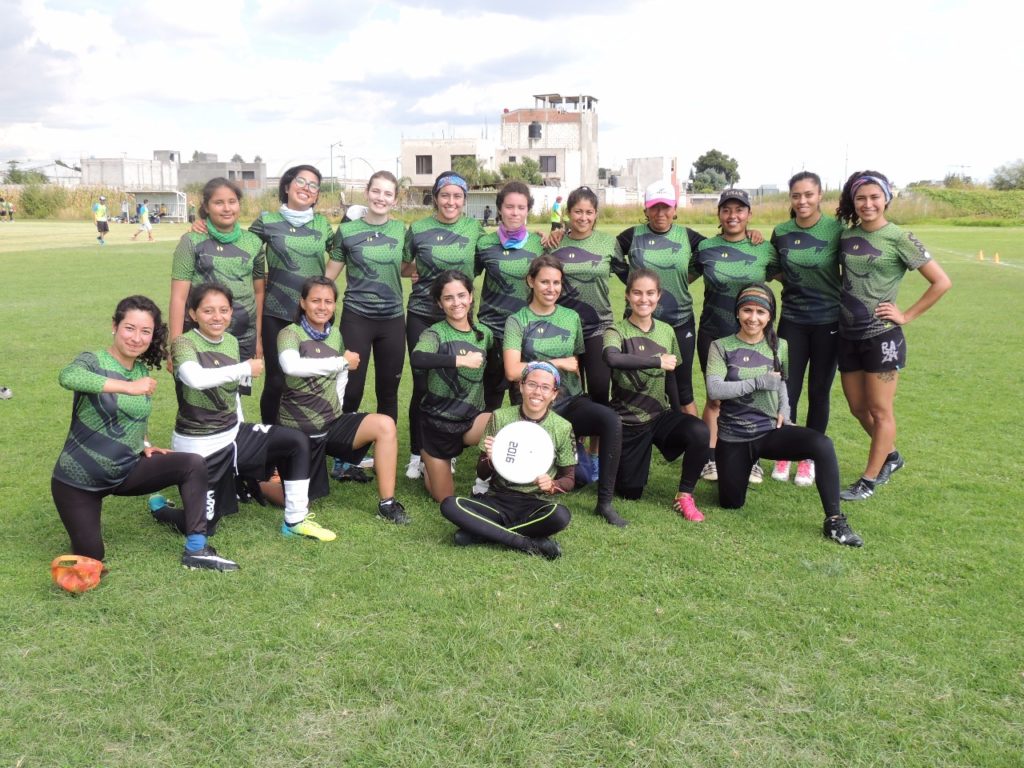
Having spent most of my life growing up and playing ultimate in the U.S., I can testify to how much media coverage and attention U.S. ultimate can get. I believe there is a certain level of pride in the U.S. knowing that you have proximity and access to some of the world’s best teams. However, ultimate is one of the fastest growing sports in the world – and the ultimate community and experience is much more diverse than we may realize. We stand to gain so much by listening to other members of the ultimate community and expanding our tight-knit community to include others who may not share our language, background, wealth or access to playing opportunities.
I was introduced to ultimate through my dad – himself a player now competing on a great grand masters team – growing up in Salt Lake City, Utah. Although I took a casual interest in ultimate as a kid, I became much more interested in it when my family moved to Chiapas, Mexico for a year when I was 12. The weekly pickup games we participated in were a way for me to begin to enjoy the sport and to integrate myself into the Mexican community. Since then, I’ve gotten to play in many tournaments in Mexico. I was honored to be a part of the Mexican U-20 Women’s National Team at the 2018 World Junior Ultimate Championships (WJUC) in Waterloo, Canada, and I’m currently planning on competing with the Mexican U-24 Mixed National Team this summer at the World U-24 Ultimate Championships in Heidelberg, Germany. I’ve really loved and have been grateful for the chance to play with ultimate players from around the world, and I’m always learning and observing new skills and lessons I want to bring back to my U.S. teammates. Here are just a few:
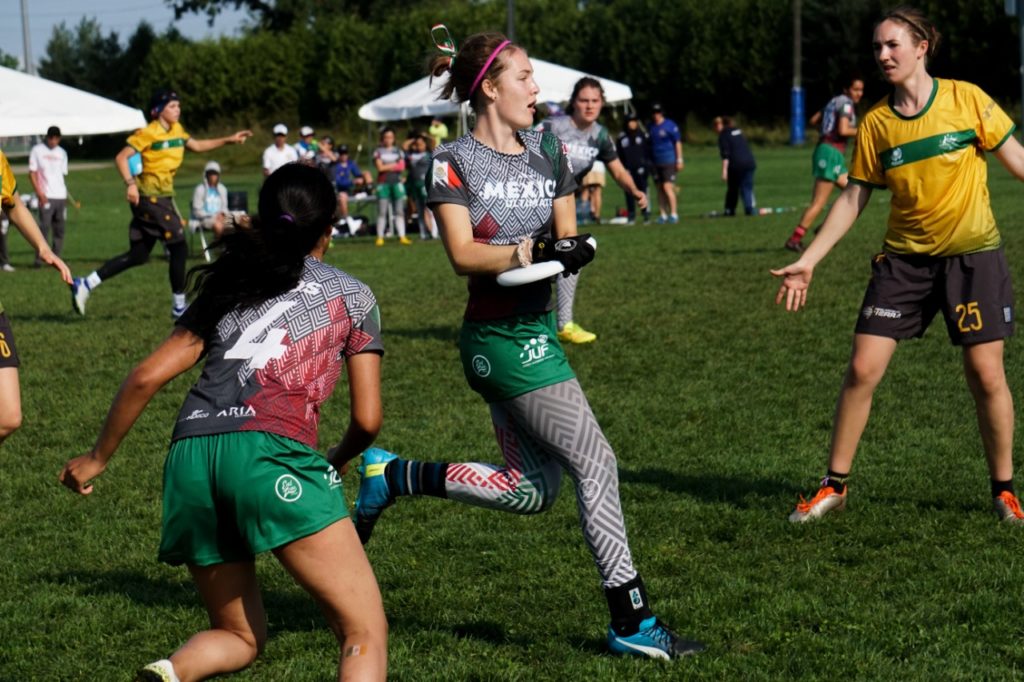
Signals
Have you ever used the internationally recognized hand signals for “pick,” “contested foul” and “travel?” I had never used them in a game until joining the U-20 Mexican team. Knowing that most of my team would have a language barrier during WJUC, we placed a significant emphasis on learning and using the WFDF hand signals to be able to better communicate. Using the signs in the U.S. would not only be the respectful thing to do for the international community, but also it would limit ambiguous shouting across the field and allow commentators and spectators to follow the discussion as well.
Spirit of the Game (SOTG)
Having played on mixed, open and women’s youth teams in the U.S., I was used to the generic spirit circle commentary, which tended to focus solely on the generic positive aspects of another team’s play – the typical “You played great!” and “We loved playing against your team!” dialogue. Afterwards, we would huddle with our team and have the more critical discussions as we reviewed the spirit score rubric. This is where we allowed ourselves to honestly evaluate exceptional or disappointing displays of SOTG by the other team.
While I am all for applauding the other team’s positive plays publicly, I feel that sometimes the pressure to “be nice” limits what we can learn from each other. What I’ve learned playing internationally is that it is OK to be more honest and give face-to-face constructive criticism.
For example, I used to feel acutely uncomfortable about the fact that, in Mexican tournaments, SOTG scores were completed before the spirit circle; then, they were brought in hand to the circle and talked through category by category. The spirit circle was a chance to explain why the other team received higher or lower marks than average. While it can be an uncomfortable conversation depending on the game and the team, I think these constructive critiques are what allow us to receive unsolicited feedback and improve our SOTG throughout a tournament and season.
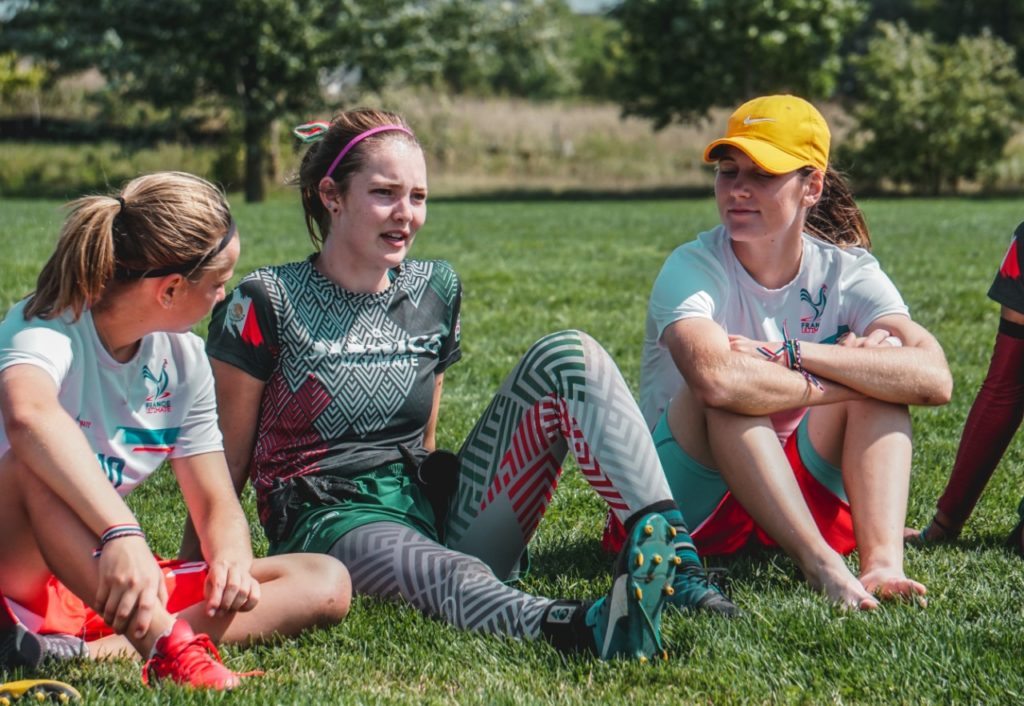
Last year, I remember being taken aback at WJUC when I was approached by an Italian player asking my team why we had given them a low score on one of the categories. The truth was, following my recommendation to my team, we highlighted and discussed only the positive displays of spirit in the spirit circle (as was the norm with teams in the U.S.). However, our opponents wanted to know the areas they could improve – this desire was shared by other teams. For example, in our spirit circle with the French National Team, they asked us to air any grievances we had with their play so they could grow and be better next time. They mentioned they would feel frustrated and blindsided in spirit circles when other teams would claim that all went well in the games, only to then give them a low score afterwards. Being honest in these situations – however uncomfortable they may be – can significantly reduce misunderstandings and allow us as individuals and as a community to grow.
Gender Equity
One of the focuses in the ultimate community in recent years has been to take steps to achieve gender equity. I think we can have a better understanding of how to reach that goal if we broaden our perspectives and learn about different steps international communities have attempted or experienced to promote gender equity. Two of my Mexican teammates, Eric Tolson and Dani Loustalot from Reflexiona Ultimate, Transforma en Acción (RUTA), wrote an excellent article in SKYD magazine about their experience trying to bring gender equity to the forefront in Mexican ultimate. Reading this article helped me validate experiences I have had playing in Mexico, as I have been told that I “play like a boy” if I do something well, or I’ve sometimes felt that I was dismissed if I made a mistake when playing with a new team. The article also gave me a lot of hope knowing there are amazing people working to find solutions for the problems that women and non-binary people face in Mexico and around the world. When we read articles like this one, we learn about the different manifestations of gender inequality that are found around the world, and we can learn from each other’s mistakes as we try to eliminate the problem worldwide.
Broadening Our Circle
While I think ultimate players generally appreciate the worldwide ultimate community, I still think we tend to be somewhat territorial when it comes to our teams – having closed practices, gatherings, etc. While there definitely is a case to be made for keeping consistent rosters and having focused training, I think being territorial can make it difficult for newcomers or visitors to get acclimated to the sport. I’ve been lucky enough to benefit from open practices/scrimmages in three continents and counting, and I know kids in the U.S. would greatly appreciate these opportunities from their local teams. Making an effort to integrate new players to a team, allowing people passing through to join a practice of scrimmage and ensuring that everyone has rides to practice, these little things can have a big impact on a person’s experience with ultimate. Back in the U.S., I hope I can be as welcoming to visiting players as those I’ve met internationally have been to me.
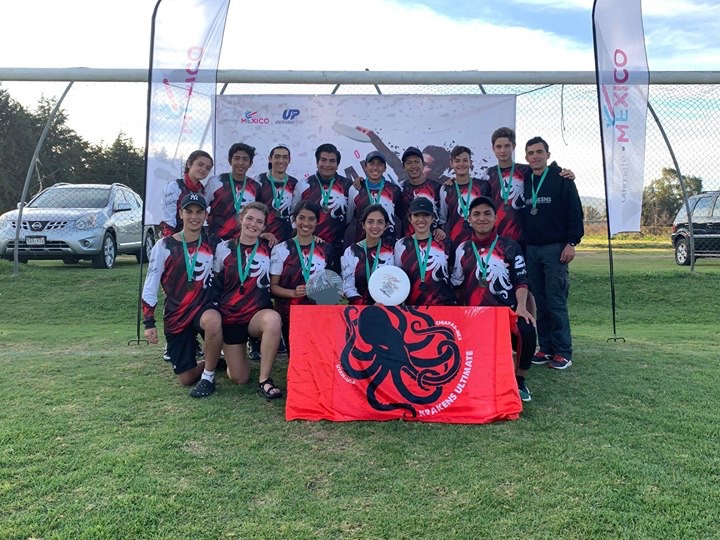
Of course, having an ultimate community outside of the U.S. has some unexpected benefits. At WJUC, the Mexican and Colombian teams bonded together by hanging out at the hotel and cheering for each other on the sidelines. This connection didn’t just happen because of a shared language and understanding of similar culture; I believe it happened because we understood what it was like to be on the periphery of the main ultimate scene. We understood one another to be approachable.
It’s Just a Game – But it’s So Much More
While I was attending the Rapaces Christmas party in Chile, there was a candle ritual where everyone took turns sharing their hopes for the upcoming year and the new season. Many people’s hopes and wishes were to work hard and improve both individually and as a team. However, one woman spoke through tears about how this team had become her second family during this difficult and lonely time in her life. Rapaces is a team made up of mostly Venezuelan players; many of them came to Chile, far away from their home country and loved ones, in order to earn enough money to send back to family members still living in Venezuela. She said the Rapaces team knew how much she missed her family in Venezuela, and having the team as her support system really helped her in the past years. For many players around the world, ultimate teams are so much more than just a team. They are a support network, community, group of friends and, sometimes, a family. The awareness that this “family” extends around the globe is the biggest takeaway I hope will resonate with my future teammates in the U.S.
